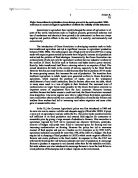Crop losses from insect pests can be staggering resulting in devastating financial loss for farmers and starvation in developing countries. Farmers typically use chemical pesticides annually. Consumers do not wish to eat food that has been treated with pesticides because of potential health hazards. Growing GM food such as Bacillus thuringiensis (B.t) corn could eliminate the application of chemical pesticides. B.t is a naturally occurring bacterium that produces crystal proteins that are lethal to insect larva; B.t crystal protein genes have been inserted into corn, enabling the corn to produce its own pesticides against insects.
There is also a risk that inserting a gene into a plant may create a new allergen.
The world population is estimated at around 6 million it is predicted that in the next 50 years that the population will double, ensuring adecuate food supply for this booming population GM foods has promised to meet this need in a number of ways.
Environmental activists, religious organisations, public interest groups, professional associations and other government officials have all raised concerns about GM goods the three main categories ;- Environmental hazards, human health risks, and economic concerns.
Genetically modified foods have the potential to solve many of the world’s hunger and malnutrition problems, and to help protect and preserve the environment by increasing yields and reducing reliance upon chemical pesticides and herbicides.
Agriculture in Europe has changed more radically and rapidly than almost any other economic sector over the past 35 years. In 1960 around 15.2 million people were employed in the agricultural sector in the six countries which made up the European Economic Community. By 1987 this had dropped by two-thirds to 5.2 million. Across the European Union today only 10 million are employed in agriculture. The drift of people away from agriculture and the land has led to a fall in the number of farms and an increase in farm size and degree of specialisation. These factors, together with intensification, have had a significant impact on the environment. Farmers are now using more fertiliser, pesticides, seed and feedstuffs than ever before and the consequent pollution of groundwater from nitrates and pesticides is approaching dangerous proportions. Intensive animal production has opened up the possibility of serious leakages of slurry and animal waste to soil and water bodies. The clearing of land for large-scale mono-cultivation has drastically reduced the number of wild animal and plant species and their habitats. Intensive agriculture can lead to loss of habitats and biodiversity pollution changes in the landscape and reduced countryside access.The clearing of tropical forests across the Earth has been occurring on a large scale basis for many centuries. This process, known as deforestation, involves the cutting down, burning, and damaging of forests. The loss of tropical rain forest is more profound than merely destruction of beautiful areas. If the current rate of deforestation continues, the world's rain forests will vanish within 100 years-causing unknown effects on global climate and eliminating the majority of plant and animal species on the planet. Deforestation occurs in many ways. Most of the clearing is done for agricultural purposes-grazing cattle, planting crops. Poor farmers chop down a small area (typically a few acres) and burn the tree trunks-a process called slash and Burn agriculture. Deforestation increases the amount of carbon dioxide (CO2) and other trace gases in the atmosphere. The plants and soil of tropical forests hold 460-575 billion metric tons of carbon worldwide with each acre of tropical forest storing about 180 metric tons of carbon. When a forest is cut and burned to establish cropland and pastures, the carbon that was stored in the tree trunks (wood is about 50% carbon) joins with oxygen and is released into the atmosphere as CO2.
Tropical deforestation also affects the local climate of an area by reducing the evaporative cooling that takes place from both soil and plant life. As trees and plants are cleared away, the moist canopy of the tropical rain forest quickly diminishes. Less evaporation means that more of the Sun's energy is able to warm the surface and, consequently, the air above, leading to a rise in temperature. Many of the rain forest plants and animals can only be found in small areas, because they require a special habitat in which to live. This makes them very vulnerable to deforestation. If their habitat is destroyed, they may become extinct. Every day, species are disappearing from the tropical rain forests as they are cleared. We do not know the exact rate of extinction, but estimates indicate that up to 137 species disappear worldwide each day. The loss of species will have a great impact on the planet. We are losing species that might show us how to prevent cancer or help us find a cure for AIDS. Other organisms are losing species they depend upon, and thus face extinction themselves.
Charlotte Seaman.
.
Waugh. D. 1995 Geography An intergrated approach. 2nd Edition.







